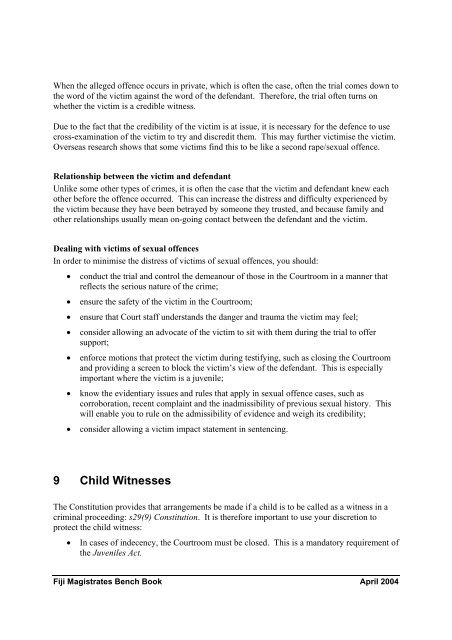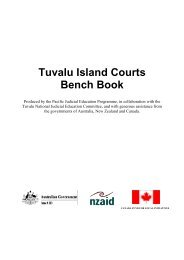Fiji Magistrates Bench Book - Federal Court of Australia
Fiji Magistrates Bench Book - Federal Court of Australia
Fiji Magistrates Bench Book - Federal Court of Australia
Create successful ePaper yourself
Turn your PDF publications into a flip-book with our unique Google optimized e-Paper software.
When the alleged <strong>of</strong>fence occurs in private, which is <strong>of</strong>ten the case, <strong>of</strong>ten the trial comes down to<br />
the word <strong>of</strong> the victim against the word <strong>of</strong> the defendant. Therefore, the trial <strong>of</strong>ten turns on<br />
whether the victim is a credible witness.<br />
Due to the fact that the credibility <strong>of</strong> the victim is at issue, it is necessary for the defence to use<br />
cross-examination <strong>of</strong> the victim to try and discredit them. This may further victimise the victim.<br />
Overseas research shows that some victims find this to be like a second rape/sexual <strong>of</strong>fence.<br />
Relationship between the victim and defendant<br />
Unlike some other types <strong>of</strong> crimes, it is <strong>of</strong>ten the case that the victim and defendant knew each<br />
other before the <strong>of</strong>fence occurred. This can increase the distress and difficulty experienced by<br />
the victim because they have been betrayed by someone they trusted, and because family and<br />
other relationships usually mean on-going contact between the defendant and the victim.<br />
Dealing with victims <strong>of</strong> sexual <strong>of</strong>fences<br />
In order to minimise the distress <strong>of</strong> victims <strong>of</strong> sexual <strong>of</strong>fences, you should:<br />
• conduct the trial and control the demeanour <strong>of</strong> those in the <strong>Court</strong>room in a manner that<br />
reflects the serious nature <strong>of</strong> the crime;<br />
• ensure the safety <strong>of</strong> the victim in the <strong>Court</strong>room;<br />
• ensure that <strong>Court</strong> staff understands the danger and trauma the victim may feel;<br />
• consider allowing an advocate <strong>of</strong> the victim to sit with them during the trial to <strong>of</strong>fer<br />
support;<br />
• enforce motions that protect the victim during testifying, such as closing the <strong>Court</strong>room<br />
and providing a screen to block the victim’s view <strong>of</strong> the defendant. This is especially<br />
important where the victim is a juvenile;<br />
• know the evidentiary issues and rules that apply in sexual <strong>of</strong>fence cases, such as<br />
corroboration, recent complaint and the inadmissibility <strong>of</strong> previous sexual history. This<br />
will enable you to rule on the admissibility <strong>of</strong> evidence and weigh its credibility;<br />
• consider allowing a victim impact statement in sentencing.<br />
9 Child Witnesses<br />
The Constitution provides that arrangements be made if a child is to be called as a witness in a<br />
criminal proceeding: s29(9) Constitution. It is therefore important to use your discretion to<br />
protect the child witness:<br />
• In cases <strong>of</strong> indecency, the <strong>Court</strong>room must be closed. This is a mandatory requirement <strong>of</strong><br />
the Juveniles Act.<br />
<strong>Fiji</strong> <strong>Magistrates</strong> <strong>Bench</strong> <strong>Book</strong> April 2004
















